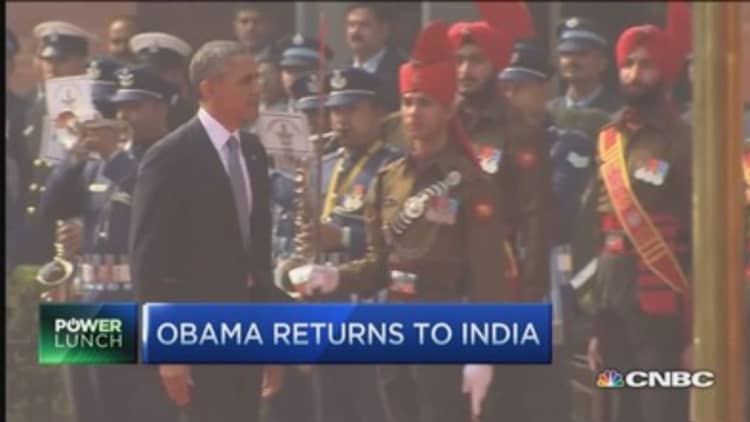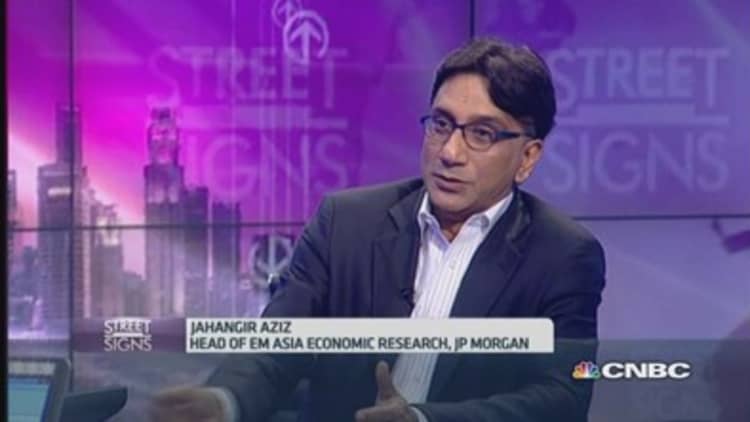
U.S. President Barack Obama ended a landmark day in India on Monday with a pledge of $4 billion in investments and loans, seeking to release what he called the "untapped potential" of a business and strategic partnership between the world's largest democracies.
Earlier in the day, at the invitation of Prime Minister Narendra Modi, Obama was the first U.S. president to attend India's annual Republic Day parade, a show of military might that has been associated with Cold War anti-Americanism.
It rained as troops, tanks and cultural floats filed through the heart of New Delhi, but excitement nevertheless ran high over Obama's visit, which began on Sunday with a clutch of deals to unlock billions of dollars in nuclear trade and to deepen defense ties.
Both sides hope to build enough momentum to forge a relationship that will help balance China's rise by catapulting democratic India into the league of major world powers.

The leaders talked on first name terms, recorded a radio program together and spent hours speaking at different events, but despite the bonhomie, Obama and Modi reminded business leaders, including the head of PepsiCo, that trade ties were still fragile.
India accounts for only 2 percent of U.S. imports and one percent of its exports, Obama said. While annual bilateral trade had reached $100 billion, that is less than a fifth of U.S. trade with China.
"We are moving in the right direction ... That said, we also know that the U.S.-India relationship is defined by so much untapped potential," Obama told the Indian and U.S. business leaders. "Everyone here will agree, we've got to do better."
Read MoreBig change in India on its way: Finance Minister
Modi said U.S. investment in India had doubled in the past four months and vowed to do more to slash the country's notorious red tape and make it one of the world's easiest places for business.
Obama said that U.S. Export-Import Bank would finance $1 billion in exports of 'Made-in-America' products. The U.S. Overseas Private Investment Corporation will lend $1 billion to small- and medium-sized enterprises in rural areas of India.
Regarding renewable energy, a key focus for Modi, $2 billion will be committed by the U.S. Trade and Development Agency for renewable energy, Obama said.
Most significant was an agreement on issues that, despite a groundbreaking 2006 pact, had stopped U.S. companies from setting up nuclear reactors in India and had become one of the major irritants in bilateral relations.
"Mobama breaks N-deadlock," ran the front-page headline of the Mail Today newspaper, which carried a photograph of Modi and Obama hugging each other warmly.
Global reach
Obama and Modi sat behind a rain-spotted screen as the parade unfolded along Rajpath, an elegant lawn-bordered boulevard dating from the British colonial era that connects the presidential palace to India Gate.

Helicopters showered petals on the crowds, and then tanks, missiles, stiffly saluting soldiers, brass bands and dancers filed past the guests.
Obama's presence at the parade signals Modi's willingness to end India's traditional reluctance to get too close to any big power. Instead, he is seeking close ties with them all, even as he pushes back against China and take sides on other global issues.
Modi has injected a new vitality into the economy and foreign relations since his May elections.
Obama's second visit to India is the latest upturn in a roller-coaster relationship with Washington that a year ago was scarred by protectionism and a fiery diplomatic spat.
The United States views India as a vast market and potential counterweight to China's assertiveness, but has been frustrated with the pace of New Delhi's economic reforms.
"There are still too many barriers, hoops to jump through, bureaucratic restrictions that make it hard to start a business, or to export, to import, to close a deal, deliver on a deal," Obama told a forum of CEOs from both countries in New Delhi.
In a joint statement that made a veiled reference to China's territorial claims, Modi and Obama stated their commitment to freedom of navigation in the South China Sea.
India could even play a role in battling Islamic State, the White House said on Monday, underlining the confidence that New Delhi is increasingly prepared to engage with global security.
"The leaders agreed to exchange information on individuals returning from these conflict zones and to continue to cooperate in protecting and responding to the needs of civilians caught up in these conflicts," the two sides said in a joint statement.
They also agreed to a 10-year framework for defense ties and struck deals on cooperation that included joint production of drone aircraft and equipment for Lockheed Martin C-130 military transport plane.

